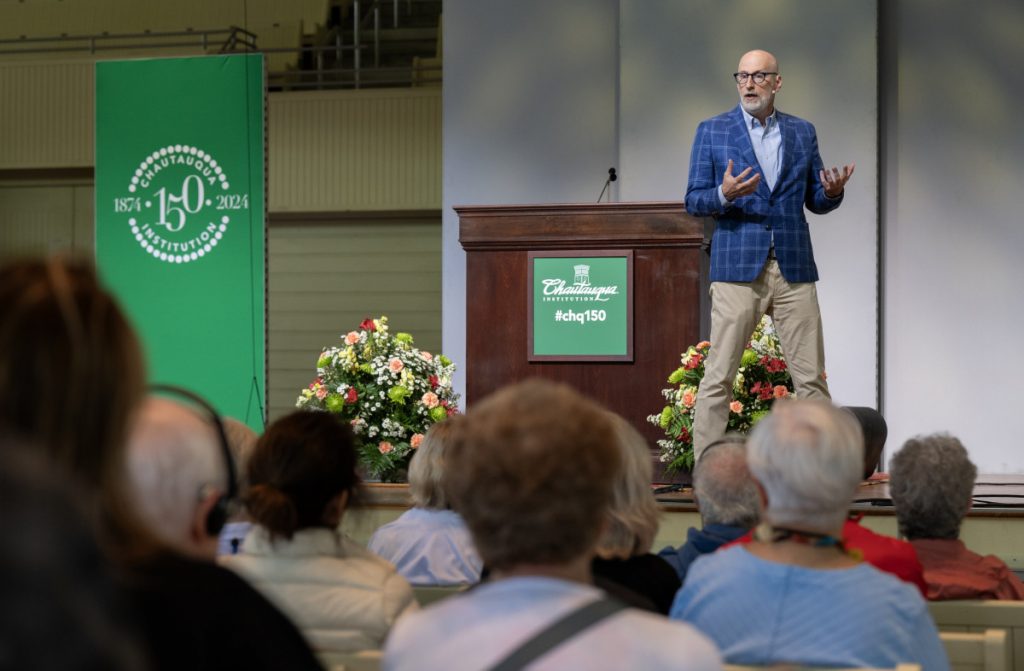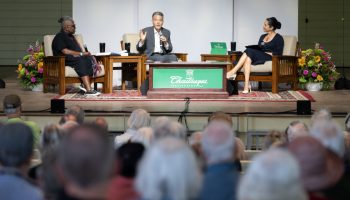
David French, opinion columnist for The New York Times and an inaugural recipient of the Chautauqua Perry Fellowship in Democracy, traces the evolution of presidential power during his lecture Friday in the Amphitheater.
David French took the stage at 10:45 a.m. Friday in the Amphitheater to discuss the increased power of the American presidency and the unequal distribution of power among the three branches of the U.S. federal government. In doing so, he closed out the Chautauqua Lecture Series’ Week One theme of “The Evolution of the Modern Presidency.”
French, who identifies as an evangelical conservative, works as an opinion writer for The New York Times, and is a former litigator specializing in constitutional law. French, a U.S. Army veteran and recipient of the Bronze Star, was also recently named an inaugural recipient of the Chautauqua Perry Fellowship in Democracy, along with Thursday’s speaker, Melody Barnes.
French’s lecture addressed the danger of a president granted too much power in relation to the other two branches of the federal government — the legislative and judicial branches.
French began by explaining that the idea of “co-equal” branches of government is, in reality, untrue and inaccurate. He said that, on paper, Congress is the most powerful branch of the federal government, granted the powers to initiate spending, impeach the president or members of the Supreme Court of the United States, and declare war. According to French, the system is designed this way because Congress is the branch of the federal government that is closest to the people.
“Especially at the opening of the American experiment, this is really the only place where the democratic process was really peeking in at all,” French said.
“The presidency originally was going to be selected by an electoral college that was going to be very different from what we think of as the Electoral College today. Senators were selected out of the states, not by popular vote, so the House of Representatives was kind of your shot at democracy,” French said. “So: Democracy manifested through Congress. It was democracy that gave the American experiment its power.”
In our current system, he said, with the executive holding the most power and Congress holding the least, many Americans’ voices are not represented because they do not live in a swing state or a swing district and, therefore, their votes are not always accurately represented. That means “an absolute majority of American citizens genuinely feel as if they don’t have a meaningful voice in that selection process.”
“You have this presidency where the most powerful person at the head of the most powerful branch of government, it’s a practical matter selected only by a small minority of Americans,” he said. “Does anyone begin to see why that might be a problem for American public confidence and democracy? That’s an immense problem; it’s an alienating problem.”
French said that in practice, Congress is currently the least powerful branch of government. He posited that the power of the president has increased exponentially in recent history, resulting consequently in a sharp decline in the power of Congress. The executive branch has slowly absorbed powers that were originally granted to the legislative branch, thereby extending that power to the president instead of Congress and upending the power dynamic established in the Constitution.
This is detrimental to the United States, he said, because while the founding fathers accounted for the dangers posed to democracy and the American republic by many factions, they did not necessarily account for the current scenario in which two primary political parties are pitted against one another and, as a result, loyalty to one’s party is stronger than loyalty to the republic.
“The executive branch is now by far the most powerful branch of government. Not only does the executive branch obviously run the executive branch, the executive branch chooses, with the help of a Congress that again has been diminished, chooses one of the other branches of government, the judiciary, and increasingly, the executive branch is adopting to itself legislative traditional congressional powers,” French said.
He also posited that the role of the president has morphed into three distinguishable duties: head of the executive branch, head of state, and head of the political party.
The current system of choosing the president is balanced precariously on the idea that whomever is elected demonstrates the virtues that the American public values. A problem arises, though, according to French, if this is not the case.
“Imagine you have somebody who is actually, genuinely malevolent in many ways, (who) grasps this power or begins to possess this power, and then the preexisting instability, the preexisting danger, can move towards crisis,” said French.
French said that this willingness to relinquish power to the president is born, in part, out of fear. As presidents have found ways to bypass Congress in conflict situations throughout history, Congress and the public have gradually accepted this so as to be ready for war, should one arise. The result, according to French, is that peacetime presidents have acquired and even surpassed the power of their wartime predecessors.
He said that the current electoral strategy is based on the idea that in order to defeat the opponent and keep evil in check, one must win. This, he said, is an unsustainable tactic and not a feasible solution.
“At this point, we should all be mature enough to know that the other side is going to win. As much as we don’t like it, the other side is going to win. Not every time, maybe not even most of the time, but at the very least, some of the time the other side is going to win,” he said. “So, we have to change our mindset from ‘The most important thing to deal with presidential power is to make sure that my president that I want to win, wins,’ to ‘Hey, if this power that the president possesses would terrify me if it is in the hands of somebody that I don’t support, maybe they shouldn’t have that power.’ ”
French said a change in mindset within the American public is integral to redistributing the power among the branches of government. He believes a way to fix this unsustainable mentality is to limit the power of the president and revitalize the power of Congress to quell the fear that comes with the precarity of election cycles.
“If we begin to think about it systematically, in the sense that says that the power of the president should never be so great that a lost election could put American democracy in mortal danger,” he said, “if we take that approach, we can begin to restore balance.”
French pointed to a study conducted by The Hidden Tribes of American Project that aimed to understand political engagement and disengagement in the United States. The study found that the “exhausted majority” comprises a large group of people in left, center and right-leaning demographics who are disengaged, unheard and unseen. The “exhausted majority” plays an integral component in restoring democracy and a more equitable distribution of power within the federal government in French’s opinion.
According to French, if there is any hope of restoring American democracy and the American republic, it will require moral courage. Inspired by a lively conversation with others the night before his lecture — indeed, the night of the first presidential debate this election cycle — French said that restoring American democracy will require this courage from everyone.
“And what is this thing that we have to have in this country if we’re going to restore American democracy and the American republic to the kind of functioning republic, participatory republic that the founders, many of them, aspired, but did not actually end up creating in that first iteration? Guys, it’s going to require moral courage,” French said.
The moral center of the United States must make the conscious decision to hold, he said, and that within his circles, he will continue to foster a “passionate intensity.”
To close, French offered the words of Aragornfrom J.R.R. Tolkien’s The Lord of the Rings.
“I see in your eyes the same fear that would take the heart of me,” French quoted. “And there might be a time when the courage of men will fail, when we will forsake our friends and break all bonds of fellowship. But it is not this day. This day we will fight.”




